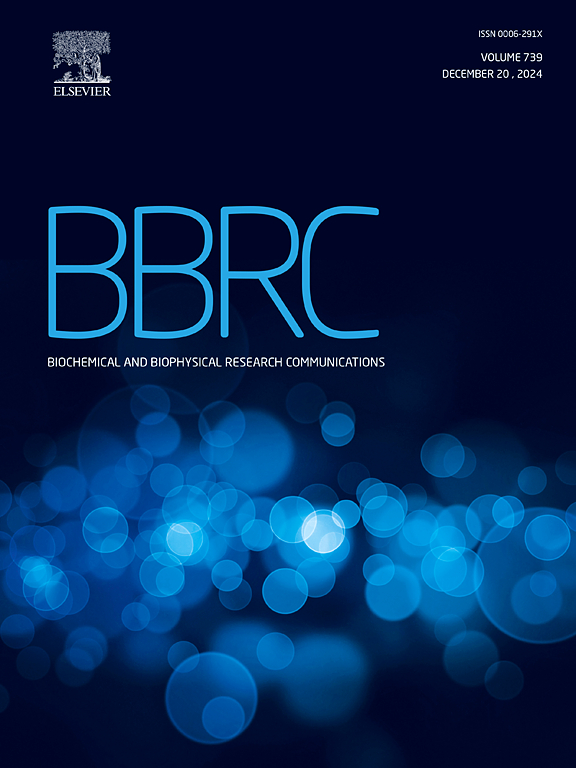周期蛋白依赖性激酶12影响蛋白激酶D1激酶活性
IF 2.5
3区 生物学
Q3 BIOCHEMISTRY & MOLECULAR BIOLOGY
Biochemical and biophysical research communications
Pub Date : 2025-06-19
DOI:10.1016/j.bbrc.2025.152221
引用次数: 0
摘要
一种独特的侵袭性前列腺癌分子亚型是由周期蛋白依赖性激酶12 (CDK12)基因的复发性突变驱动的,这种突变不包括其他常见的遗传改变。蛋白激酶D1 (PrKD1)在前列腺癌中是一种公认的肿瘤抑制因子。磷酸化蛋白质组学研究已经确定丝氨酸681和685是cdk12突变肿瘤中推测的PrKD1磷酸化位点;然而,这些蛋白质是否直接相互作用或对其中任何一种蛋白质的功能的潜在影响仍然未知。在这项研究中,我们利用共免疫沉淀和双分子荧光互补(BiFC)实验证明了前列腺癌细胞系中PrKD1和CDK12之间的直接相互作用。丝氨酸681和685是CDK12中假定的PrKD1磷酸化位点,而丝氨酸2和丝氨酸5在RNA聚合酶II上的磷酸化并没有改变。有趣的是,这些定点诱变实验导致了PrKD1激酶活性的改变。分子模型研究表明,丝氨酸681位点的磷酸化,或丝氨酸681和685位点的磷酸化,将PrKD1从自抑制构象中释放出来,促进其激酶活性。这些发现提示CDK12在前列腺癌中调节PrKD1激酶功能的潜在调节作用。本文章由计算机程序翻译,如有差异,请以英文原文为准。
Cyclin-dependent kinase 12 influences protein kinase D1 kinase activity
A unique and aggressive molecular subtype of prostate cancer is driven by recurrent mutations in the cyclin-dependent kinase 12 (CDK12) gene, which occur exclusive of other common genetic alterations. Protein Kinase D1 (PrKD1) is a well-established tumor suppressor in prostate cancer. Phosphoproteomics studies have identified serines 681 and 685 as putative PrKD1 phosphorylation sites in CDK12-mutated tumors; however, whether these proteins interact directly or the potential impact on either protein's function remains unknown. In this study, we demonstrate a direct interaction between PrKD1 and CDK12 in a prostate cancer cell line using co-immunoprecipitation and a bimolecular fluorescence complementation (BiFC) assay. Site-directed mutagenesis of serines 681 and 685, the putative PrKD1 phosphorylation sites in CDK12, did not alter the phosphorylation of the well-established CDK12 substrates, serines 2 and 5 on RNA polymerase II. Interestingly, these site-directed mutagenesis experiments resulted in altered PrKD1 kinase activity. Molecular modeling studies suggest that phosphorylation at serine 681, or both serines 681 and 685, releases PrKD1 from an autoinhibitory conformation, promoting its kinase activity. These findings suggest a potential regulatory role of CDK12 in modulating PrKD1 kinase function in prostate cancer.
求助全文
通过发布文献求助,成功后即可免费获取论文全文。
去求助
来源期刊
CiteScore
6.10
自引率
0.00%
发文量
1400
审稿时长
14 days
期刊介绍:
Biochemical and Biophysical Research Communications is the premier international journal devoted to the very rapid dissemination of timely and significant experimental results in diverse fields of biological research. The development of the "Breakthroughs and Views" section brings the minireview format to the journal, and issues often contain collections of special interest manuscripts. BBRC is published weekly (52 issues/year).Research Areas now include: Biochemistry; biophysics; cell biology; developmental biology; immunology
; molecular biology; neurobiology; plant biology and proteomics

 求助内容:
求助内容: 应助结果提醒方式:
应助结果提醒方式:


